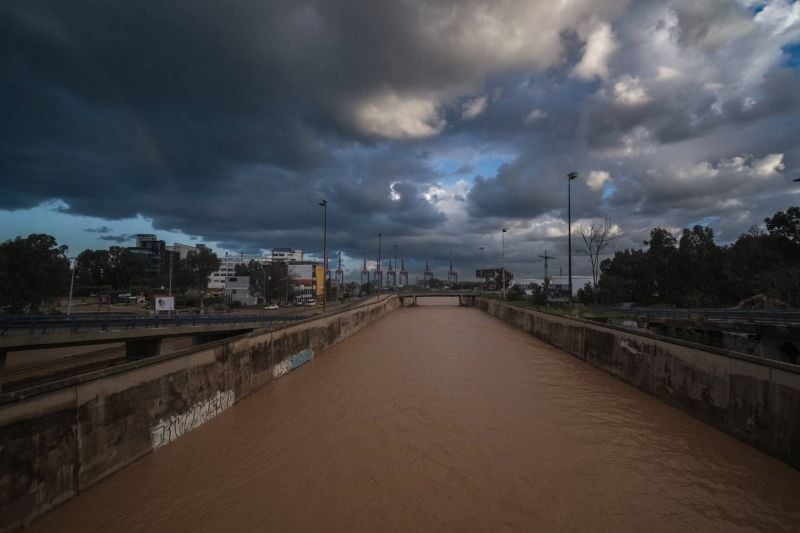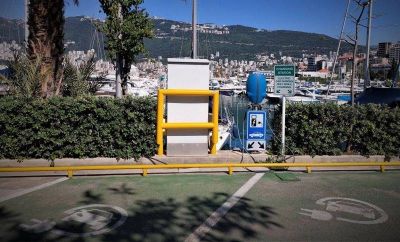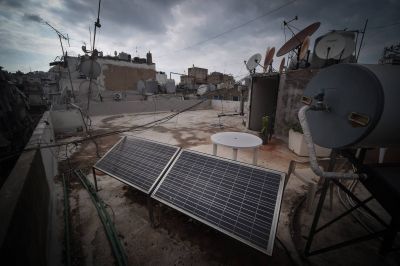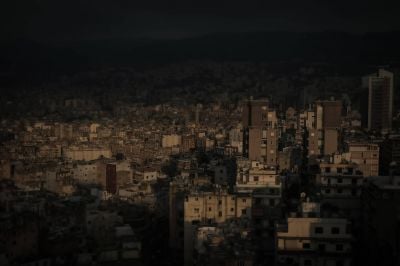
The Beirut River after the Christmas floods in Karantina, Beirut, Dec. 24, 2023. (Credit: João Sousa/L'Orient Today)
BEIRUT — A report by the World Bank released Wednesday has concluded that Lebanon is one of the countries least prepared in the world to face climate change, ranking second to Yemen in the region and in 161st position out of 192 countries globally in terms of climate change readiness.
The Lebanon Country Climate and Development Report (CCDR), published by the World Bank (WB) office in Beirut warns that even in the current “strained fiscal and institutional context, the cost of inaction is high.” It points to Lebanon’s “limited adaptive capacity” as the root of the problem, acknowledging that the ongoing economic crisis aided by institutional corruption has made it difficult to prevent the deterioration of public services, “thus accelerating environmental degradation.”
The report proposes that investments in energy, water, transport, and solid waste services in Lebanon are “urgently needed” in the short-term, arguing that supporting these sectors is vital in mitigating the impact of climate change on Lebanon’s “development path,” as the country attempts to build itself up again after years of multifaceted crises.
Climate change in Lebanon will result in more frequent and extreme weather events, WB says, which will in turn affect Lebanon’s GDP and fiscal balance.
“Overall, the climate change impacts covered in the CCDR are projected to reduce Lebanon’s growth potential by up to 2 percent annually by 2040 and impede service provision, especially in water.”
According to the report, climate change is expected to reduce water availability in Lebanon by 9 percent before 2040 (up to 50 percent during the dry season), and to induce significant losses in sectors that are considered key to Lebanon’s recovery, particularly agriculture and tourism, with annual losses expected to reach $250 million and $75 million respectively.
Electricity: 43 percent reduction in emissions
The WB report examines the risks of the climate crisis on Lebanon through four sectors — energy, water, transport and solid waste — as "key pillars of climate-sensitive recovery." It also identifies policy actions and investments under two macroeconomic scenarios: a business-as-usual scenario and a recovery scenario, based on macro-fiscal reforms.
According to the report, decarbonizing Lebanon's electricity sector offers a triple dividend: a 41 percent reduction in economic costs, a 43 percent reduction in emissions, and improved macro-fiscal performance thanks to lower fuel imports. The development of renewable energies will not only reduce costs and meet growing demand, but also mitigate emissions and create more jobs, the report argues.
The electricity crisis, mainly the result of catastrophic management practices, has been ongoing for decades: the almost exclusive reliance on private generators for electricity supply since the crisis has multiplied the presence of dangerous and carcinogenic pollutants in the air.
In the water sector, the report continues, it is essential to strengthen climate adaptation capacities in order to support water security through additional storage capacity, more efficient water use, and the restoration of resilient water supply services. This sector is also characterized by consistent mismanagement, which hinders the protection of resources while more often than not depriving residents of a decent supply.
Beyond the electricity and water sectors, the WB report suggests promoting the electrification of public transport and improving solid waste management, which offer "opportunities to simultaneously advance the development and climate agendas."
770 million in 'urgent' funding
“The Lebanon CCDR assesses the impact of an urgent financing envelope of US$770 million that responds, in the short term [2024-26], and under any scenario, to partial yet critical needs in the four sectors,” the report declares.
WB says that it used macroeconomic modeling to determine the impacts of such a support package and determined that it would “not place debt on an unsustainable footing.” It also recommends that Lebanon mobilize private sector financing to help improve “fiscal and debt dynamics” by limiting the government’s share of totally investment spending.
In the longer term, CCDR estimates that Lebanon will need to invest around $7.6 billion between 2024 and 2030 in the four sectors covered by the report in order to "align its recovery with cost-effective climate action." The energy sector alone would require an investment of around $4 billion to diversify production towards cleaner, affordable renewable energy sources, and to switch from liquid fuel to natural gas.
"The cost of inaction today will be too high for future generations," said Jean-Christophe Carret, World Bank Director for the Middle East. He argued that "given limited budgetary space and institutional and development challenges,” Lebanon should prioritize the suggested measures in those four specific sectors with urgency, and recognize the synergy that exists between public services when they are adequately supported.
This article was originally published in French on L'Orient-Le Jour. Translated to English by Amelia Hankins.


